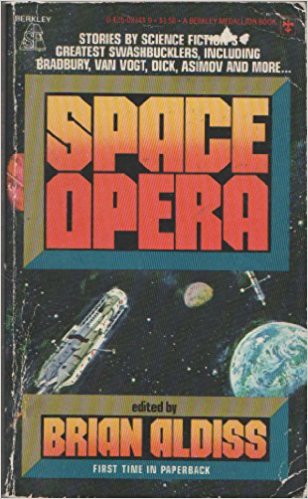
I had other plans for today’s FFB, but with the recent death of Brian Aldiss, I thought I’d pay homage to one of great Science Fiction writers by featuring one of my favorite SF anthologies, Space Opera (1974). Aldiss wrote eloquently about Science Fiction in his Trillion Year Spree, but I think the memory of Brian Aldiss is best served by this quirky collection of Space Opera stories with Aldiss’s brilliant “Introduction.” My first Brian Aldiss story was half of an ACE Double titled Bow Down to Nul back in the 1960s. I thought Bow Down to Nul was somehow connected to A. E. Van Vogt’s World of Null-A (another half of an ACE Double I’d recently read). Wrong! What is your favorite Brian Aldiss work? GRADE: A
TABLE OF CONTENTS:
“Introduction” (Brian W. Aldiss)
“Is Everything an Illusion?” (Brian W. Aldiss)
“Zirn Left Unguarded, the Jenghik Palace in Flames, Jon Westerley Dead” (1972) (Robert Sheckley)
“Honeymoon in Space” (excerpt from A Honeymoon in Space) (1968) (George Griffith)
“The Red Brain” (1927) (Donald Wandrei) (appeared in Futura edition only)
“Tonight the Sky Will Fall” (1952) (Daniel F. Galouye)
“Precipices of Light That Went Forever Up ….” (Brian W. Aldiss)
“The Star of Life” (excerpt) (1947) (Edmond Hamilton)
“After Ixmal” (1962) (Jeff Sutton)
“Sea Change” (1956) (Thomas N. Scortia)
“Exile Is Our Lot” (Brian W. Aldiss)
“Breaking Point” (1953) (James E. Gunn) (appeared in Futura edition only)
“Colony” (1953) (Philip K. Dick) (did not appear in Futura edition)
The Sword of Rhiannon (excerpt) (1949) (Leigh Brackett)
“All Summer in a Day” (1954) (Ray Bradbury)
“The Mitr” (1953) (Jack Vance)
“The Godlike Machines” (Brian W. Aldiss)
“The Storm” (1943) (A. E. van Vogt)
“The Paradox Men” (1949) (Charles Harness)
“Time Fuze” (1954) (Randall Garrett)
“The Last Question” (1956) (Isaac Asimov)
“Answer” (1954) (Fredric Brown) (appeared in Futura edition only)
“Envoi” (Brian W. Aldiss)
Hothouse(Long Afternoon of Earth as its first US publication). Remember reading it first as a series of novelettes in F&SF. I’ve read it several times over the years.
Steve, I read THE LONG AFTERNOON OF EARTH as a kid in the Sixties. Blew me away! The web between the Moon and the Earth still haunts me.
BOW DOWN TO NUL was the first Aldiss I read, too. I don’t remember a thing about it. I might take another look. I read THE TRILLION YEAR SPREE when it was THE BILLION YEAR SPREE. Never got around to the later revision.
Bill, I think THE BILLION (or TRILLION) YEAR SPREE is an entertaining history of Science Fiction written by an insider.
BILLION YEAR SPREE here too, Bill. I haven’t read enough Aldiss to judge. The first I read was a recommendation from a friend – THE HAND-REARED BOY.
Jeff, Steve’s choice of THE LONG AFTERNOON OF EARTH is a favorite of mine, too. Plenty of memorable images.
George, I loved HOTHOUSE/THE LONG AFTERNOON OF EARTH and THE BILLION/TRILLION YEAR SPREE, but the first book that came to mind was REPORT ON PROBABILITY A, which some have claimed to be science fiction’s first “anti-novel” (and maybe it is). When I first tried to read it in my early twenties I couldn’t get through the first few pages, but when I finally sat down and read the whole thing through I was blown away. The complexity of the book was amazing. Aldiss, like Ballard, Leiber, and Ellison, was not afraid to explore new approaches, and here he did it magnificently.
Jerry, I confess I haven’t read REPORT ON PROBABILITY A but I do own a copy. I’ll move it up on my Read Real Soon stack after your strong recommendation.
I was surprised not to see HG Wells’s science fictions classics, like The First Men in Moon, and others.
I was surprised not to see HG Wells’s science fictions classics, like The First Men in Moon, in the collection, SPACE OPERA Edited by Brian Aldissand
Thommy, Aldiss focuses on Space Opera from the Golden Age of Science Fiction.
BOW DOWN TO NUL is minor but of some interest. It involves an alien race with three sexes, and at one point we get a sexual fantasy of one of said aliens. Years later, I read some toney mainstream critic sniffing about certain verities were unassilable, such as only two sexes being conceivable to a reader, and my first thought was “well, said critic obviously didn’t have the chops to sell the short half of a minor Ace Double back in the fifties, so why should I believe anything else he believes?”